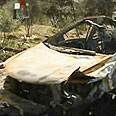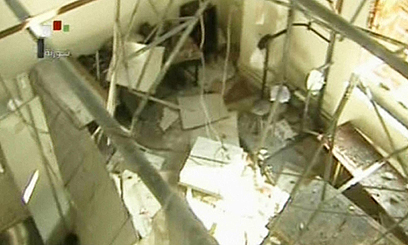
The images, aired on Saturday, show the damage caused by what Syria claims was an air raid against the Jamraya Scientific Research Center, on the outskirts of Damascus.
Related stories:
- Turkey urging Syria to attack Israel?
- US to Syria: Don't transfer weapons to Hezbollah
- Syria, Iran threaten retaliation against Israel
Jamarya is located northwest of the war-torn country's capital. Time Magazine reported Friday that "The center was flattened out of concern that it might fall into the hands of Islamist extremists fighting to topple the government of Syrian President Bashar Assad."
US officials, speaking on condition of anonymity, said the raid targeted a convoy of trucks carrying surface-to-air missiles from a military complex suspected of housing chemical agents towards the Lebanese border.
According to Ynet's military analyst Ron Ben-Yishai, a close examination of the footage released by Syrian television from the bombed site corroborates the claim that the target of the attack was a convoy of vehicles carrying anti-aircraft missiles, not a military research complex.
Damascus insists the target was the Jamraya Scientific Research Center, but the last part of the video clearly shows vehicles carrying anti-aircraft missile systems, apparently type SA-8 (the older version of the SA-17) – as Western media outlets have claimed. The radar antennas and other details indicate that the images are of a Russian-made mobile anti-aircraft missile battery. Syria did not want to reveal the more advanced weapons systems, as an agreement it signed with the Russians forbids it to transfer arms to Hezbollah.
The footage shows that buildings in the research complex were damaged by an explosion that took place nearby and that the actual target of the attack was a weapons convoy.
While both Jerusalem and Washington refrained from commenting on reports of the alleged strike, US security officials were quoted by several top American media outlets as saying that Israel informed the US about its intentions, adding that the target was a shipment of SA-17 anti-aircraft weapons that could cut into Israel's ability to fly reconnaissance flights over Lebanon.
SA-17s are highly sophisticated anti-aircraft missiles, which would be strategically "game-changing" in the hands of Hezbollah.
Syria, Lebanon and the rest of the Arab world, were unanimous in their condemnation of the alleged strike.

(Photo: AFP, Syrian TV)
Damascus announced it "reserves the right to retaliate," adding that numerous air-defense battalions – particularly those deployed in the area stretching between the Syrian capital and the Lebanese border – were placed on high alert.
Iran said that it will "Lend its full support to Syria to keep it strong. The Arab world has to do everything it can to minimize the suffering of the Syrian people as they fight against Israel's aggressions and the international community's arrogance."
Turkey criticized the war-torn country's inaction. Foreign Minister Ahmet Davutoglu urged Damascus to retaliate: "Why didn't (Bashar) Assad even throw a pebble when Israeli jets were flying over his palace and playing with the dignity of his country?" Davutoglu told reporters Saturday.
"Why didn't the Syrian Army, which has been attacking its own innocent people for 22 months now from the air with jets and by land with tanks and artillery fire, respond to Israel's operation? Why can't Assad, who gave order to fire Scud missiles at Aleppo, do anything against Israel?"
Ankara, he said, "Will not stand by when a Muslim country is attacked."
- Receive Ynetnews updates
directly to your desktop















